Enough
by David Fetcho
just give me
enough money
to live a quiet life
by the sea,
detaching bit by bit
from all the excellences
my pride demands;
like the excellence
of the moon in its
self-effacing installation;
like the swallows’
self-forgetting
calligraphy
of invisible purpose
in invisible air.
sky-opening song
by David Fetcho
in the day that I rise up to meet youthere will be singing
your arms will encircle the day
I will be welcome
I will offer you my heart standing
amid the straight trees
I will offer you my song
in the manner of a warrior
in the way of a servant I gather
the hours of wheat and maize
water and the kneading
of dough
my fingers stiffen
caked with crust then
through another harvest
I await your return
in joy
are the woodlands arrayed to greet you
the sea you once smiled on
is called “Bestower of Peace”
with joy and peace will we dance
the ancient steps
in harmony our feet will disturb the dust
in the day that I rise up to meet you
yes
there will be singing
David Fetcho, a long time contributor and supporter of Radix Magazine, was a multidisciplinary artist, writer, and composer living in Oakland, California. He took his creative work seriously and sought, in all his endeavors, to “aim deep”, combining social commentary and critique with original artistic expression. David died suddenly in 2021, and left behind a body of poetry his friends are still discovering and exploring. He wrote: “My expectations are modest: that for some folks unknown to me, my music and poetry might open a window–maybe just a little bit–and allow them to get a glimpse of the secrets of their own heart as it tries to make sense of this world.”
The Blessingway
by Diana Vagianos Armentrout
After the blessingway
roses fall from my hair
white and pink – in each room of the house.
We dreamt of this as girls:
flowers braided into our hair.
The artist paints with henna
on my swollen belly:
roses and dragonfly
my skin loose this second time.
My daughter is dying inside me
her heartbeat strong inside me
where she is safe until labor
my womb the sacred space
between worlds: dark and light
contracting for 21 days.
All that, to hold her for a moment,
her broken heart and defects
body limp in my embrace, her blue eyes
and me in this pool as it fills with blood.
I hold her to me and whisper We love you
We love you, We’ll always love you.
Go, I say, do your work, Sweet Baby.
The placenta is birthed and she slips away
so quietly I can’t know the exact moment.
I carry her body wrapped in a blanket with pink roses
for hours, hungry and exhausted, I don’t leave her
until that moment, the coffin on my bed.
Mother and I dress her in her christening gown
and lay her down, arms stiffening
body cooling . . .
The Master asks What now, Strong Woman?
Then answers Your milk will come in. You will awaken
for weeks listening for cries never made.
And the child? I reply The daughter?
The one I longed for for decades?
–She does not desire one drop of your milk.
With the angels I still weep and cry
Holy, Holy . . .
Reprinted from Walking the Labyrinth of My Heart: A Journey of Pregnancy, Grief & Newborn Death © 2016 Dianna Vagianos Armentrout published by White Flowers Press.
Diana Vagianos Armentrout is a published writer, teacher, workshop facilitator and poetry therapist. Dianna’s pregnancy with her daughter, Mary Rose, who died an hour after birth of trisomy 18, changed her life completely. Her blog, Walking the Labyrinth of My Heart, was launched in April 2015 as a way of offering support to others going through pregnancies with life-limiting and fatal diagnoses.
Dianna’s poems, short fiction and essays have been published in several journals and anthologies, including The Vermont Literary Review, The Connecticut Review, The Dos Passos Review, Melusine or Women in the 21st century, Sacred Fire Magazine, Sensations Magazine, and Inkwell.
Dianna lives in Littleton, Colorado, with her family. When she isn’t writing or reading, she spends her time outdoors hiking and gardening. Dianna also bakes amazing paleo cookies and shares them with those around her.
Cracks
by Janice Freytag
From my window I watch geese make their way
south. Between the panes of glass, a stray
ladybug is dying. This is when they seek me out,
land on my sleeves, enter my house,
not wanting to be alone in their final days.
I inch open the outer pane for her, but she won’t go.
She doesn’t see the way forward. She doesn’t know
the voice whispering through lonely cracks,
calling her out of her warm cul-de-sac
into a resurrection planned long ago.
Hangman
by Janice Freytag
In the pew in front of metwo girls play Hangman on
a heart-shaped piece of paper.
What is the word?
The communion plate passes,
and they jostle the wafers.
The whole row giggles.
This is my body broken for you.
This is the word made flesh.
I don’t want to smile.
I want to think about your death,
about how you too were hanged,
so that I, letter by letter,
might discover the word.
Janice Freytag’s work has appeared in Saint Katherine Review, Relief, Windhover, the aurorean, Troubadour, as well as numerous anthologies of prize-winning poems from state and national poetry contests. She is an enthusiastic gardener and draw much inspiration from her little backyard. In addition to poetry, she has written four children’s musicals.
Roly Poly
by Angel Marie Johnson
In the beginning
the girl was a girl
and had never met
Kafka.
She became
a red balloon
dancing along
the living room
waiting to be
played with.
The balloon
became longing,
and the longing
a voice, calling
to a mother who
couldn’t see her.
The voice became
a Roly Poly.
“Roly Poly! Roly
Poly!” it sang
to the mother—
“Come find me!”
I am hiding.
I am waiting
to be found.
Angel Johnson is a Bay Area poet whose writing combines philosophical musings with observations about art, literature, and living in California. She holds a B.A. in Linguistics and Psychology from UCLA and an M.A. in Creative Writing from SF State. Her poems have appeared in Transfer Magazine, Ursa Minor, and SFSU’s Creative Writing 2020 Graduation Anthology.
The Release of Barrabas
by Molly Smith
Crucify him!
they yell
my heart is bleeding
I scrape at the still healing scabs
renewing the slick red flow
Crucify him!
they yell
poison leaks from between my lips
the cloud burns my skin
leaving blisters and scars
Crucify him!
I yell
Molly Smith is currently a student at Cumberland University, working towards her BA in English and Creative and Imaginative Writing. Born in Northern Illinois, she moved to middle Tennessee in high school and enjoys being a barista, watching movies, and roller skating.
The Spirit Leaves for Green
by Maggie Morton
My longing does not sit
with me in my living room,
glass eyes transfixed
by plasma pixels,
a porcelain doll absorbed
in predestined wanderings
of wallpaper.
(This time the flowers will converge
in blossoming ecstasy).
No, my longing stands up proper: naked
spine straight as a matchstick
above ashen feet
and finds the narrow doorway.
It walks the less traveled path
to Eden,
stands before the open gate
groaning against the trees
like a dull blade,
and waits for my body to rise
and follow.
Altar of Mind
by Maggie Morton
She came to me with darting
eyes and fists full
of question marks, and asked
me to trace Your image
like it was a flickering shadow on her wall.
Instead, I flooded the room with fluorescents,
reveled in my own spotlight.
I should have offered
a Hallelujah,
instead I spouted stanzas
of Lorem Ipsum soliloquy,
arranged constellations in the sawdust
gathered from all the corners I cut
from the altar of faithfulness.
Said Look, I’m full.
It’s the philosophical kind of sin
that has to be reasoned into the room,
that’s as rigid as a library of book spines
and straightens my own just a little too much,
like I want to see if my head can live that far
from my pulse,
now only a distant drumming
in my ear.
It sounds like
Hal-le-lu-jah.
It sounds like
A prayer.
Like I am a shadow
and I need You to retrace my steps
back to my body.
Like I need You to be
Holy
where I am only a
Ghost.
Witness
Maggie Morton
The road is stretched taughtand blue, barely manifest
like the vein pressing
against the pale skin of my wrist
bent over the steering wheel.
Windmills beat a red rhythm,
my pulse quickens.
What once was horizon
is the spilled inkwell
of a lover’s embrace,
the sky melting to meet the field
and whisper in breaths of smoke
a constellation of secrets,
a promise to raze its soil new.
I race in vain to catch
what the night would
sooner swallow
than let my headlights steal
with their flaming gaze.
Maggie Morton is an artist, poet, and writer based in Normal, Illinois. She is the former director and editor of Sight Specific, an online arts publication. Her poetry has appeared in a number of literary journals including Studio, Time of Singing, Catfish Creek, and Euphemism.
Good
by Jesse Baker
… and indeed, it was very good. — Genesis 1:31
Good, better, best: How we often suggest
What we have and what we finally long for.
We start with the tolerable, want more,
And in time reach our destination: best.
I wonder if a reevaluation
Is needed. Better and best are, at best,
Relational terms, and can start with “bad” just
As well as “good.” Better’s a promotion
From something worse; best is all we can do
In worst-case scenarios. We’ve turned
The world on its head and thereby churned
Up false expectations. Should we review
This dis-order, confess we’ve misunderstood?
Reset our aim where God began, with good?
Jesse Baker is a United Methodist pastor, and has previously written for An Unexpected Journal. He lives in North Carolina with his wife and two sons.
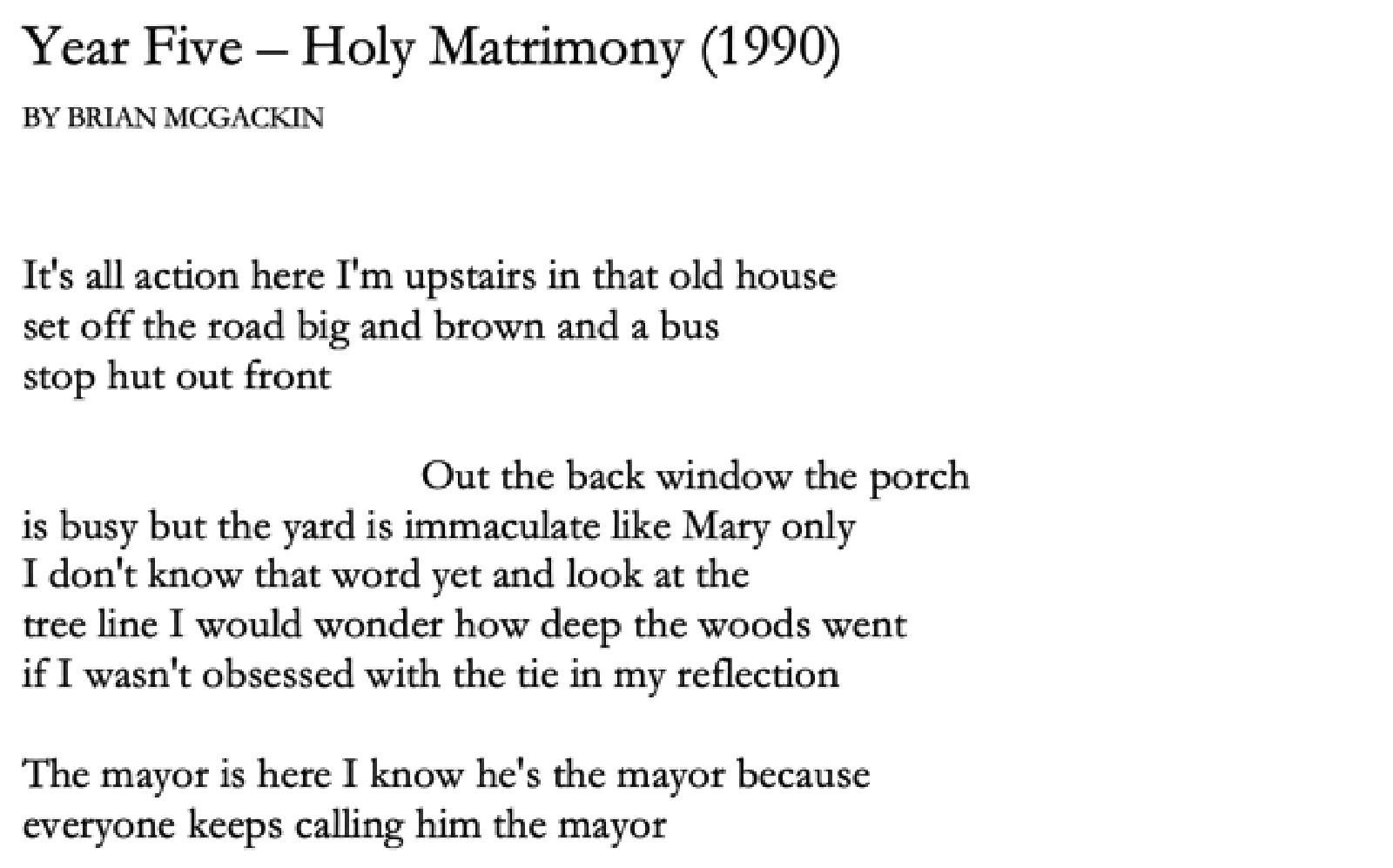

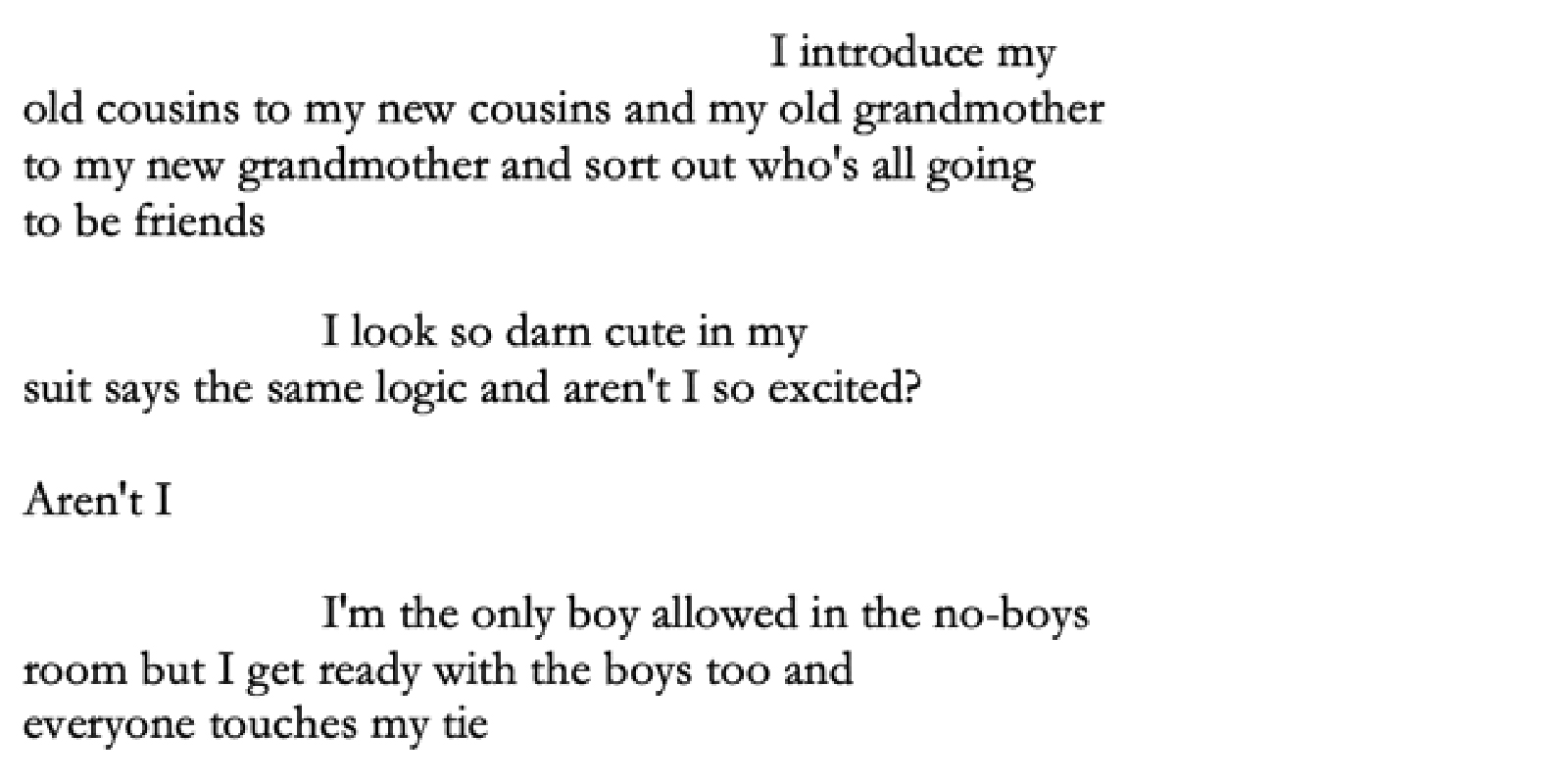


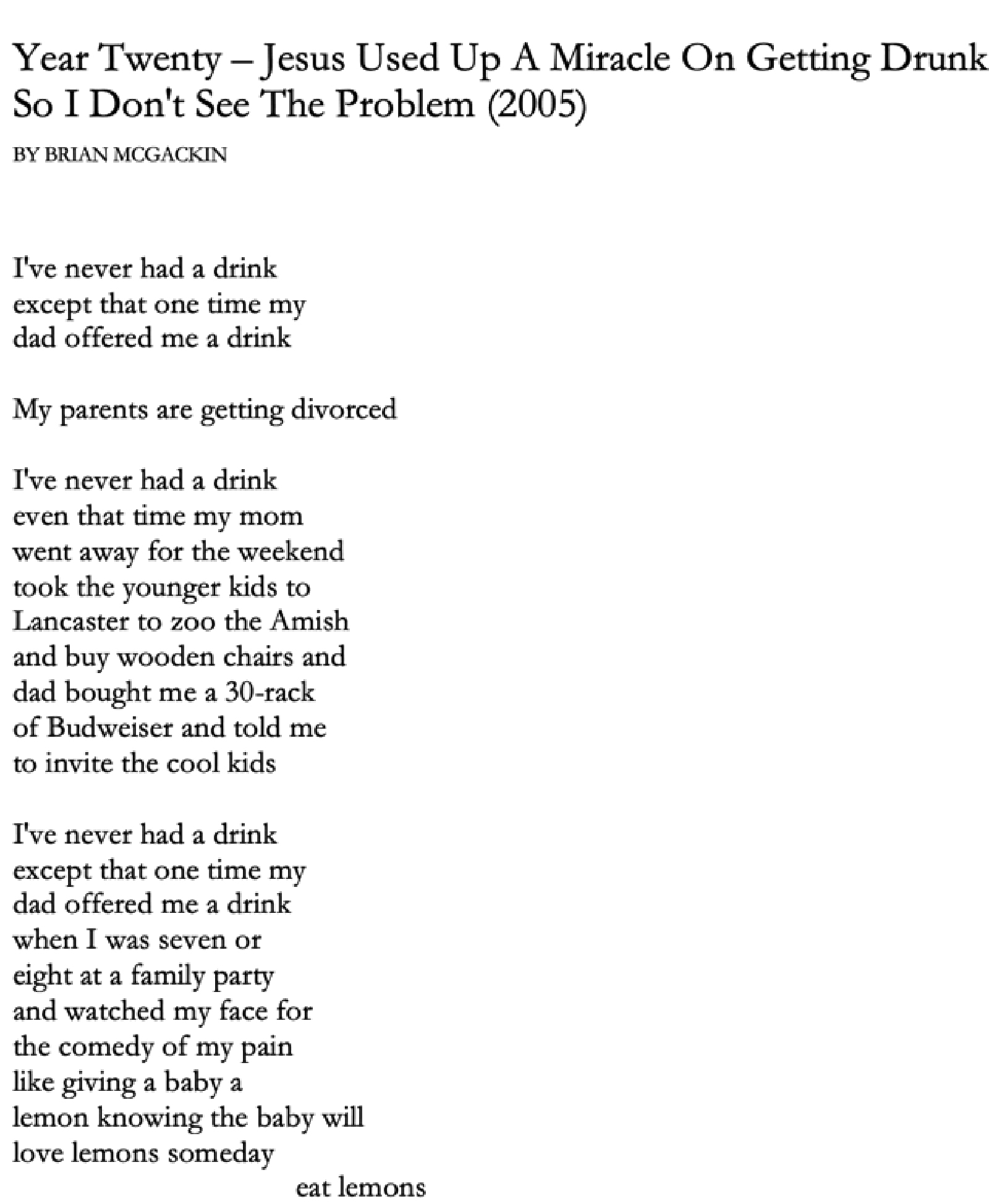




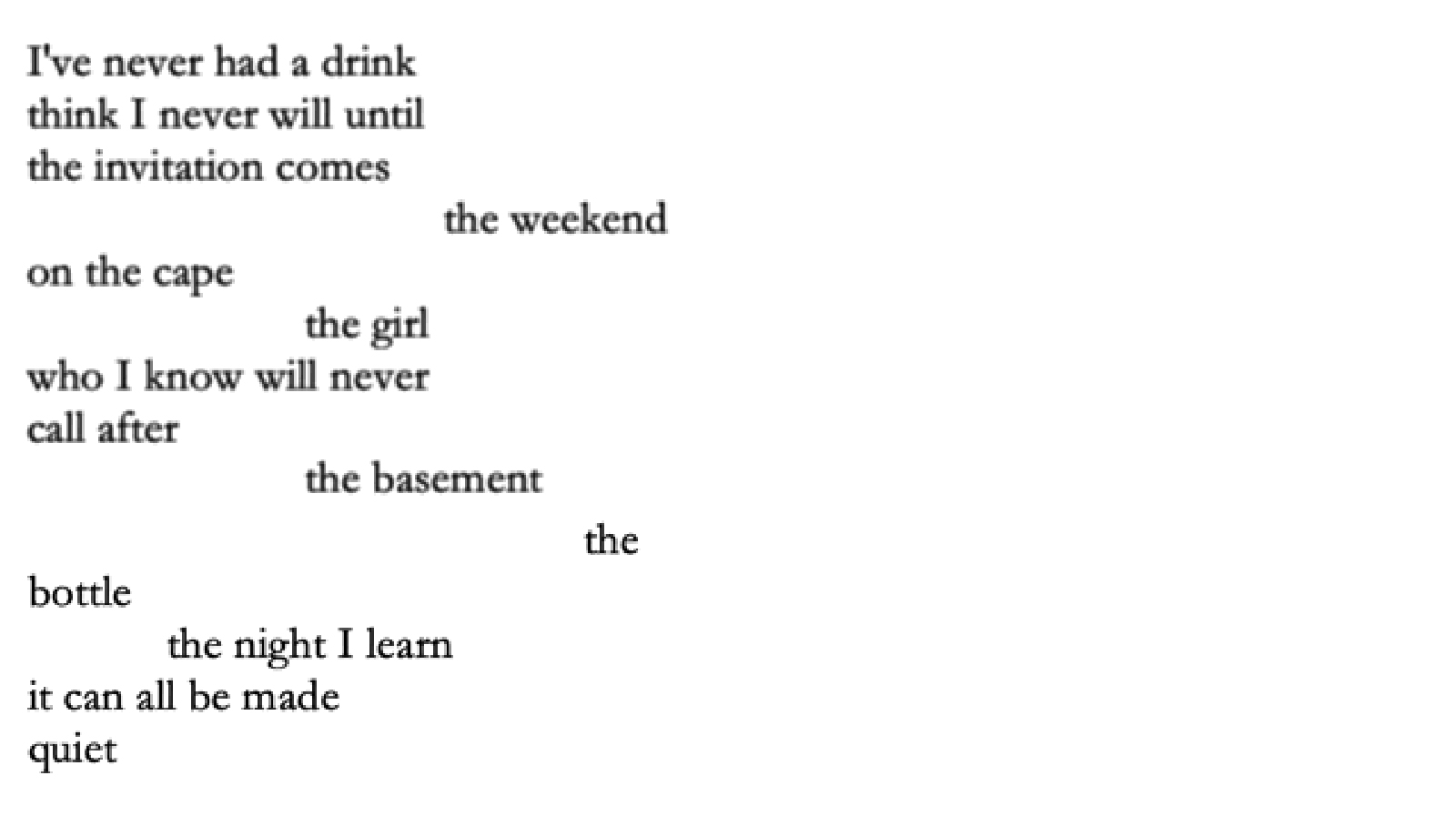
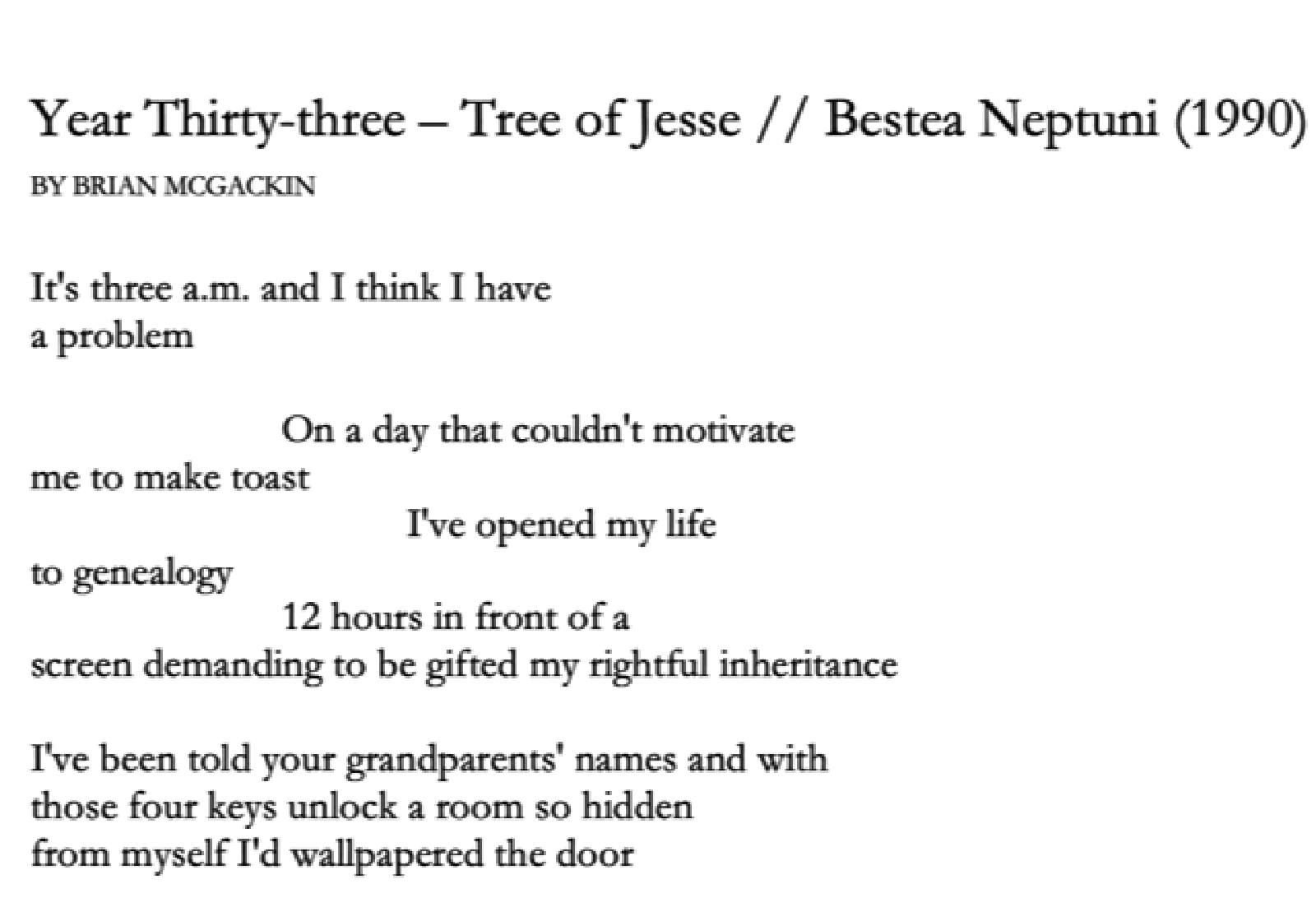


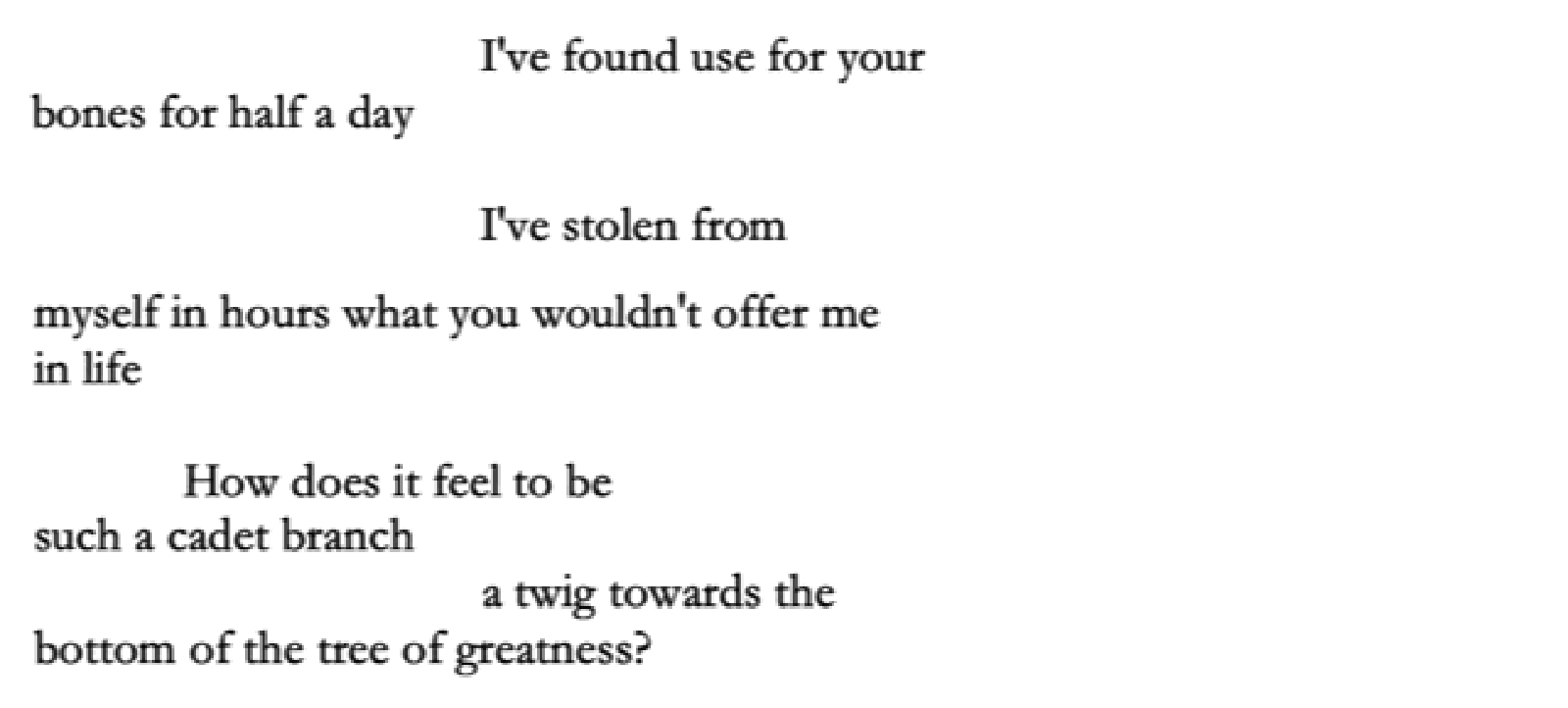
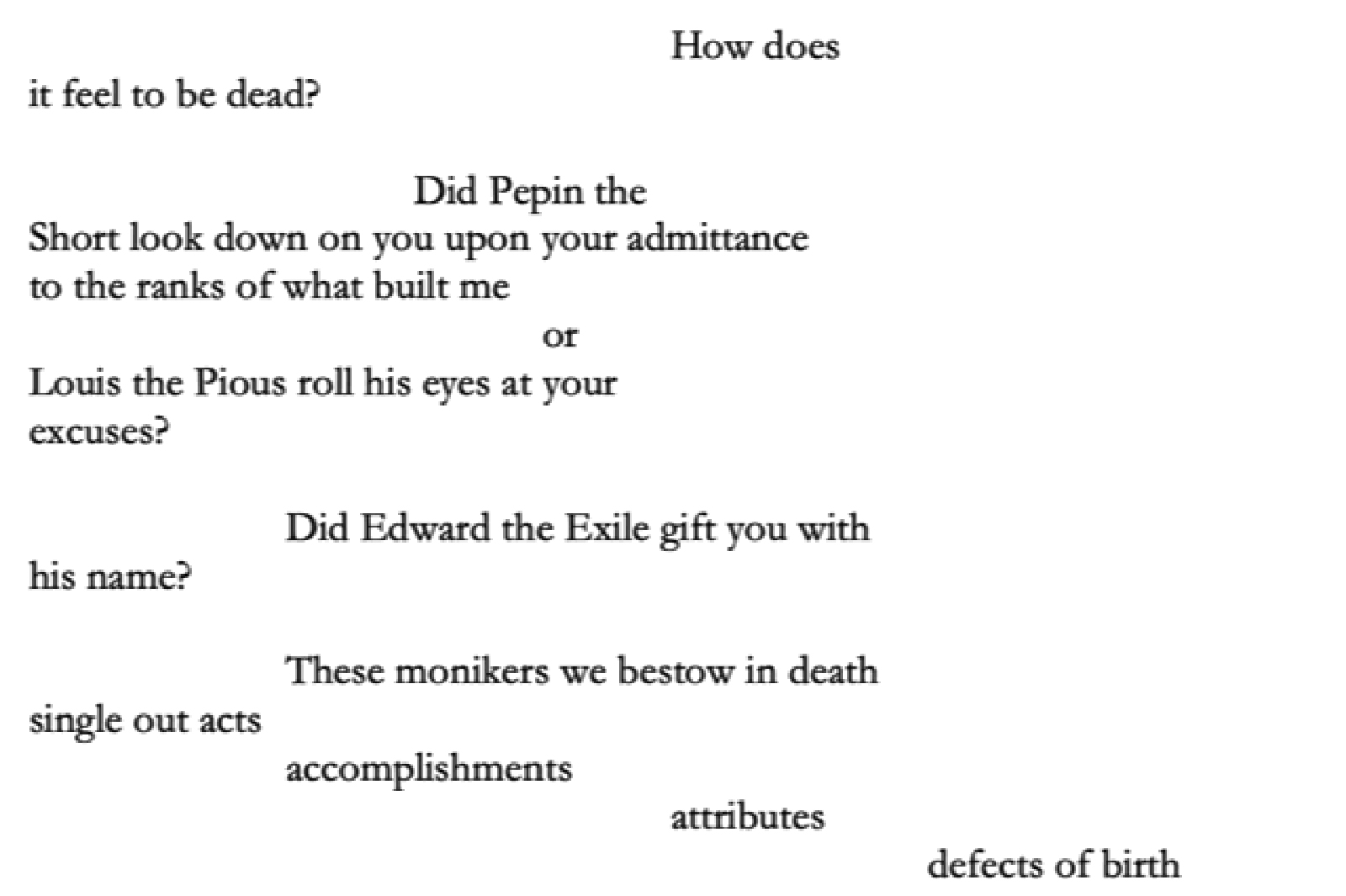

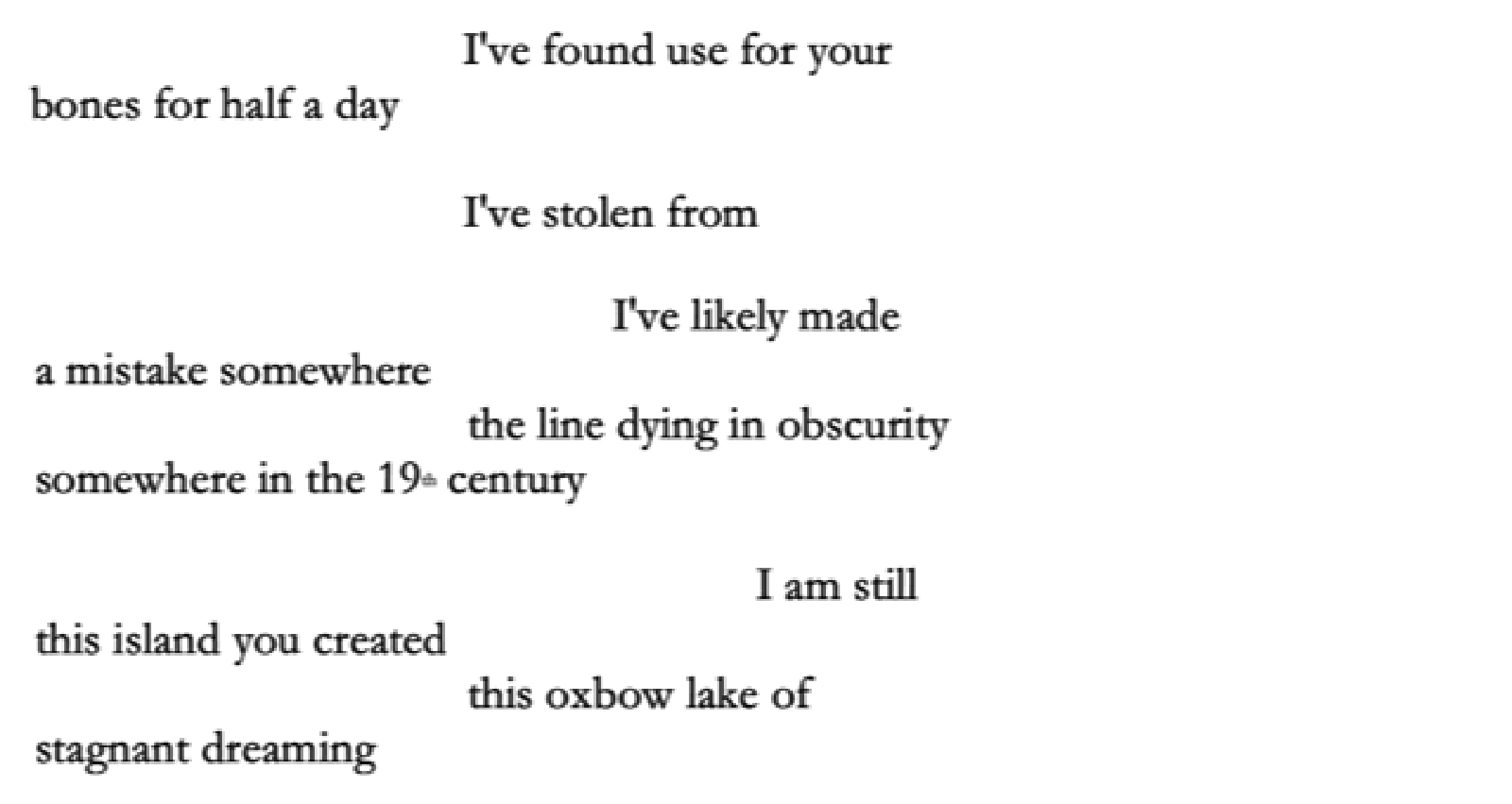
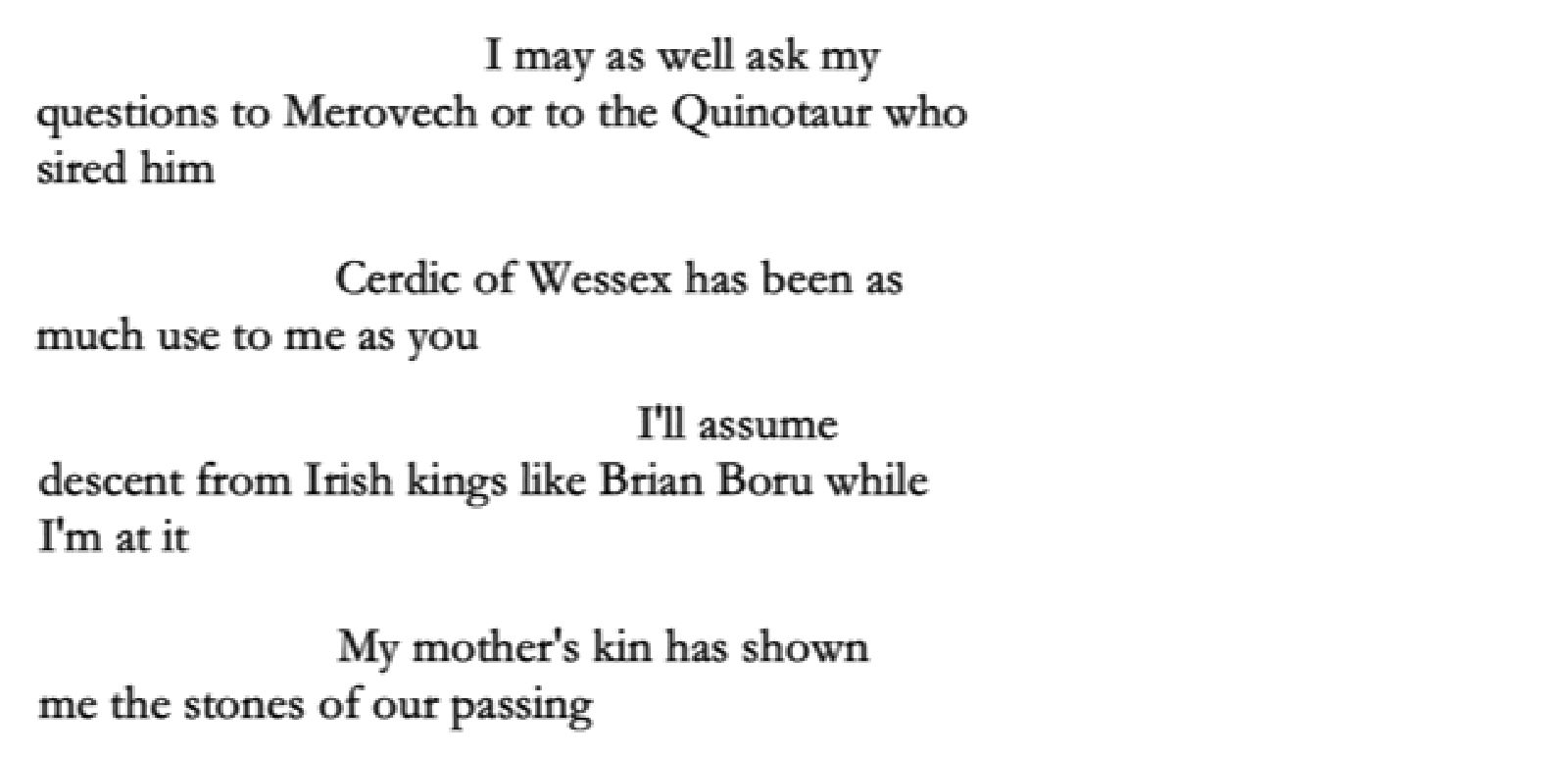
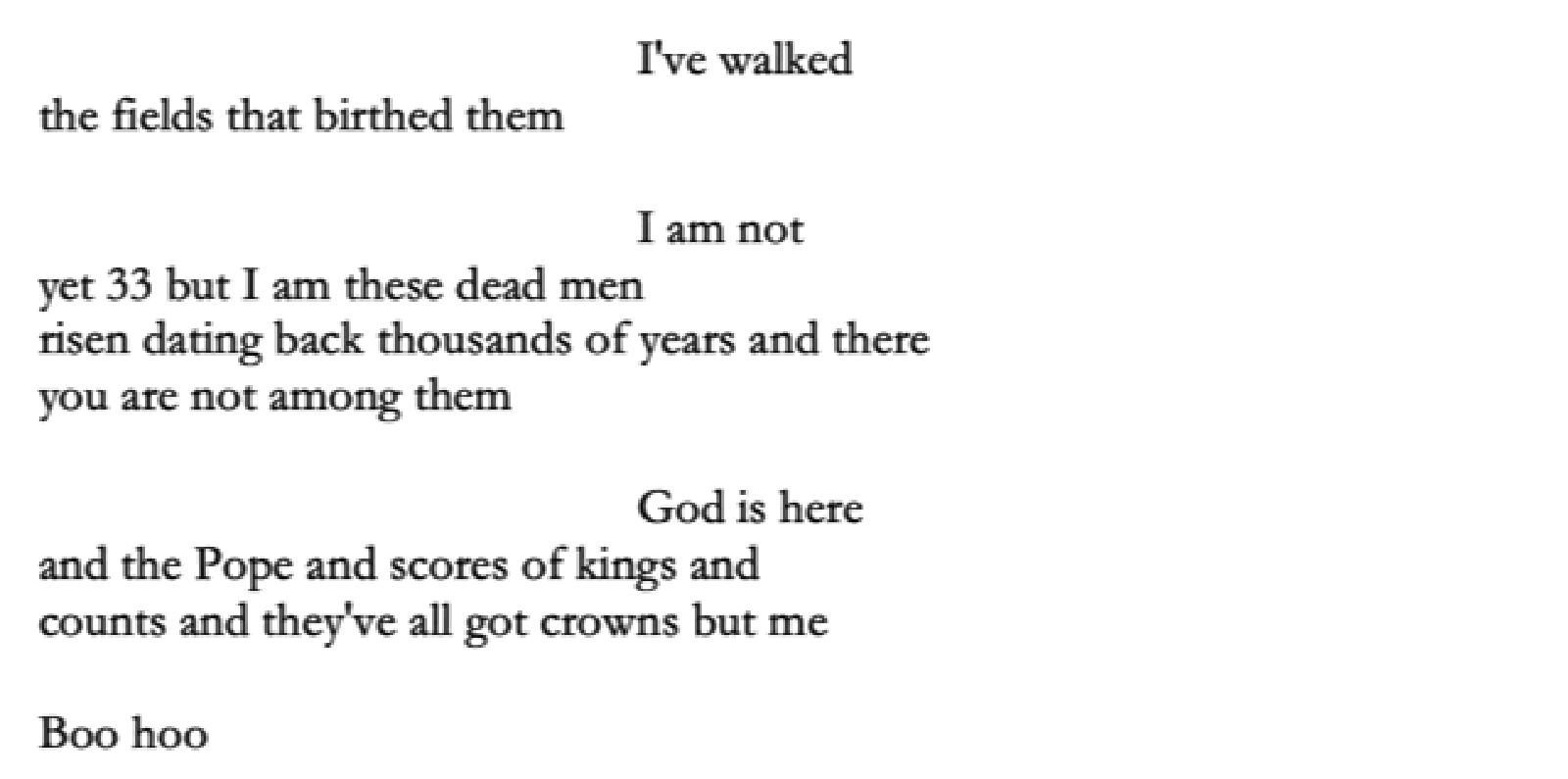

Brian McGackin is the author of Broetry (Quirk Books, 2011) and In Case of Death (Not a Cult), 2018). He has a BA from Emerson College in Something Completely Unrelated To His Life Right Now and a Masters in Poetry from USC. His work has appeared in places such as Huffington Post, New York Daily News, LitReactor, Drunken Monkeys, and The Prompt Mag. He lives in Los Angeles, where he enjoys Guinness, comic books, soccer, and classical music.
He writes: “These poems come from a collection I’ve recently completed titled ‘Father // Son // Ghost,’ about the death of my estranged biological father only a few months after we finally met. As with most of my poetry, the concept for the collected work came before the individual poems, and I wrote towards that desire. I’ve always enjoyed reading collections where the individual poems feel as though they couldn’t possibly appear in any other book, where the context of the other poems and the collection as a whole offers another layer of meaning. While many of the poems in ‘Father // Son // Ghost’ can stand on their own, I feel that they offer more to the reader when read together.”


